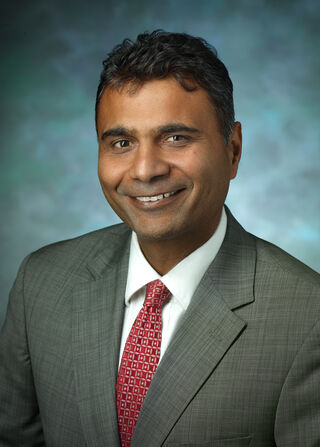Psychedelic-Assisted Therapy
The Tip of the Iceberg: Addressing Mental Health in Cancer
Exploring the growing need to treat the emotional well-being of cancer patients.
Posted March 15, 2021 Reviewed by Davia Sills
This post was written by Manish Agrawal, M.D.
More than two million people in the US are treated each year for cancer, and in recent decades, remarkable progress has been made in improving survival rates. This has been due to tireless commitment to our understanding of cancer biology, cancer genetics, and the role of the immune system in the treatment of cancer. As a result, powerful new drugs can treat cancer or stimulate the immune system to kill cancer cells, helping many people battle the disease. While traditional treatments, such as chemotherapy, radiotherapy, and surgery, are critical, there is a growing need to treat the emotional well-being of the person and those who care for them.
Emotional distress is prevalent in cancer patients
Throughout my career, both as a practicing oncologist and researcher, patient care has been my passion. After graduating in medicine and while working as a resident, I completed a Master’s degree in Philosophy and a fellowship in Bioethics. It was during this time that I really began to appreciate how patient care extends beyond the biological1.
Throughout my oncology training, we seldom, if ever, discussed the psychological distress that cancer patients face. However, the longer I’ve been in practice, the more I have realized that this aspect of patient care causes more suffering and reduces patients’ quality of life more than any other. Having a cancer diagnosis can lead to loss of meaning, loss of function, hopelessness, and despair—not only for patients but also their family and friends.
Despite cancer patients living longer, the emotional burden of a cancer diagnosis brings its own enormous disruptive reality, often stealing what remains of a pre-diagnosis life. Up to 1 in 4 cancer patients will suffer from major depression. Proper cancer care requires much more than fighting a patient’s tumor.
Compelling research has led us here
Recent research in psychedelic therapies offers hope to the growing unmet need for those living with depression. Psilocybin, an active ingredient in some species of so-called “magic mushrooms,” as well as other psychedelic compounds, has a history in medicinal use. Over the last decade, institutions such as UCLA, Johns Hopkins University, and New York University have looked at the use of psilocybin therapy in cancer patients with end-of-life anxiety2. These studies have shown that psilocybin therapy (administering a dose of psilocybin in conjunction with psychological support from a therapist) can lead to significant decreases in depressed mood and anxiety, and increases in quality of life, life meaning, and optimism.
This led me to wonder, could this be a way to offer my patients more complete cancer care?
A vision of complete cancer care
Complete cancer care is the core of our work at the Aquilino Cancer Center, an outpatient community cancer center in Rockville, Maryland, where in addition to treating cancer, we promote patients’ physical, mental, and spiritual healing. We believe this newly built Healing Center is a new standard for what’s next in cancer care and research—integrating oncologists, therapists, researchers, and integrative care experts in one community space that promotes innovation in care.

The Center for Healing opened in June 2020. The state-of-the-art space, designed by Gensler, aims to help patients and their families address the psychological impact of cancer. Carefully chosen design elements include natural materials throughout the center, lighting to accommodate relaxation, and curved walls and hidden administrative and task spaces that preserve the sense of peace in the space. The center’s bank of windows overlooks a tranquil healing garden, and natural light floods the entire center.
The center bears no resemblance to a traditional hospital, but instead takes cues from spa design, hospitality, and innovation centers while maintaining the rigor of a medical service provider. The center’s design serves to accelerate learning and care delivery in what could be the dawning of a new era in cancer care.
Psilocybin therapy for emotional distress in cancer patients
Shortly after opening, the Center launched its first study of psilocybin therapy. The patients receive a single high dose of synthetic psilocybin, combined with psychological support from a specially trained therapist before, during, and after a psilocybin session. The session typically takes six hours, and patients are supported throughout this time, one-on-one, by a therapist.
The psilocybin effects during the session can be positive or negative and are different for each person. They can include elevated mood, creativity, and an altered perception of the environment. Therapists support the patient so they are able to explore, accept the experience, and confront any difficult feelings. These experiences can be intense, but patients get to know their therapists in advance during preparation sessions to talk about what to expect and how to respond to it. And afterward, there are follow-up "integration" sessions for patients to process their experiences.
In designing this study, we were determined to include patients with all kinds of cancer, including earlier-stage cancer. Previous studies investigating the potential of psilocybin therapy have focused on patients with advanced or terminal cancer. Certainly, those patients suffer because they are grappling with death, but there are also many people living with cancer or surviving with cancer who have emotional distress that is not being addressed. Too often, patients report that they have been treated, even cured of their cancer, but emotionally they have struggled to cope with the psychological impact of this terrible disease.
Among the potential breakthroughs from this study, group administration is being researched, which means the psilocybin is given to between two to four patients simultaneously in the center. Each patient then lies on a bed in a comfortable, private space, with their therapist sitting alongside them for the entire experience. The rationale for conducting simultaneous administration of psilocybin is based on extensive results which have established the value of group support for patients with cancer. Thus, we postulated there may be a potential for increased efficacy, as well as increased efficiency, in testing simultaneous administration with one-to-one support.
This is the first study of its kind to take place in a cancer center in the U.S. Not only are we looking at simultaneous administration with one-to-one support, but we are also not restricting the study to only patients with advanced cancer.
Advancing a new form of care
A cancer diagnosis changes the course of a patient’s life. In order to have complete cancer care, we need to take care of the mental well-being of cancer patients and focus on whole-person healing. This is currently not widely addressed in cancer care, but it’s time to do something about it.

It's too early to draw conclusions from our study, but I look forward to reporting data from it in the coming year, and to working on larger studies in the future.
Manish Agrawal, M.D., is a medical oncologist and co-director of clinical research at the Aquilino Cancer Center in Maryland. He is developing a psychosocial oncology and palliative care program integrated with cancer care in this community setting. This program supports studies of psilocybin-assisted therapies to address psychological and existential distress in patients with cancer and their families.
The Healing Center at the Aquilino Cancer Center was developed by a team of people and organizations, including COMPASS Pathways. COMPASS has also provided support, funding, and training for the ongoing psilocybin therapy study of depression in cancer.
References
1. Eric J. Cassell: The Nature of Suffering and the Goals of Medicine, Oxford University Press 1991




